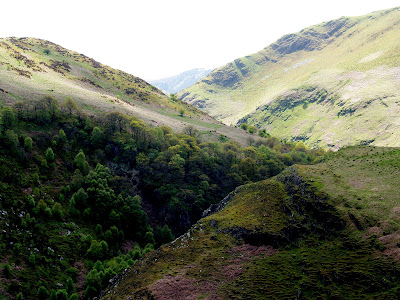This blog may help people explore some of the 'hidden' issues involved in certain media treatments of environmental and scientific issues. Using personal digital images, it's also intended to emphasise seasonal (and other) changes in natural history of the Swansea (South Wales) area. The material should help participants in field-based modules and people generally interested in the natural world. The views are wholly those of the author.
Monday, 17 April 2023
Revamping the Brecon Beacons National Park
From today, The Brecon Beacons National Park (South Wales) will be renamed Bannau Brycheiniog and its logo replaced (https://www.theguardian.com/uk-news/2023/apr/17/brecon-beacons-relaunches-with-welsh-name-bannau-brycheiniog-as-picture-of-hope-for-future). The former Brecon Beacons National Park is a much-loved collection of impressive hills, frequented by outdoor enthusiasts, field courses and military training. The new name translates as 'The Peaks of Brychan's Kingdom'. Brychan was a local 5th Century king. The former logo featured a burning beacon. Beacons were a metal-enclosed fires, formerly lit on hills, to signal events of national importance, like invasions. The beacon has now been relegated to history on the basis of its 'greenhouse gas' emissions. The new logo will feature a crown, star-strewn skies, hills and watercourses. This all sounds relatively uncontentious. One could argue, however, that including a crown is a bit 'feudal', even if it harks back to the 5th century. Revamps, like this, might well be ocassionally needed but, hopefully, the National Park will continue to serve its primary purpose of enthusing people about the natural world.
Subscribe to:
Post Comments (Atom)
-
I n the UK and US, a pparently popular and successful vegan/vegetarian restaurants are reportedly closing or adding meat to their menus ( ...
-
Early ripening fruit may seem convenient but some folk think it confirms environmental stress. There's also a possibility th...





%20mating%20NWCW.jpg)


1 comment:
RENAMING the Brecon Beacons National Park. There are more important things to be concerned about than re vamping its historical perspective. and throwing good money away on name changes and changing the corporate image. Particularly when we have overgrazed by wooly maggots, human pressure and erosion, botanical, invertebrate and avian diversity in serious decline to address. On top of that we have the added effects of changing climate on the above to consider. And we bleat on about hypothetical and abstract historical misdemeanours, cultural and racial prejudices which will have no bearing on addressing the real problems of reducing the ongoing damage to such an important habitat and region and its long term survival.
Post a Comment